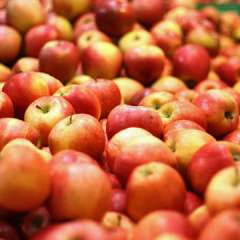...Apple juice anyone?
Apple juice can pose a risk to our health. But not necessarily from the trace amounts of arsenic that people are arguing about. Despite the government's consideration of new limits on arsenic, nutrition experts say apple juice's real danger is to waistlines and childrens' teeth. Apple juice has few natural nutrients, lots of calories and, in some cases, more sugar than soda has. It trains a child to like very sweet things, displaces better beverages and foods, and adds to the obesity problem.
The American Academy of Pediatrics says juice can be part of a healthy diet, but its policy is blunt: "Fruit juice offers no nutritional benefit for infants younger than 6 months" and no benefits over whole fruit for older kids. Some forms of arsenic, such as the type found in pesticides, can be toxic and may pose a cancer risk if consumed at high levels or over a long period. As for making good nutrition choices, "a lot of the information that people need about fruit juices is on the label.
So what's on those labels?
Carbohydrates, mostly sugars, in a much higher concentration than in milk. Juice has a small amount of protein and minerals and lacks the fiber in whole fruit. Drinking juice delivers a lot of calories quickly so we don't realize how much we've consumed, whereas we would have to eat a lot of apples to get the same amount, and "we would feel much, much more full from the apples.
Here is some advice from nutrition experts:
-Choose a juice fortified with calcium and vitamin D-3.
-Give children only pasteurized juice — that's the only type safe from germs that can cause serious disease.
-Don't give juice before 6 months of age, and never put it in bottles or covered cups that allow babies and children to consume it throughout the day, which can cause tooth decay. For the same reason, don't give infants juice at bedtime.
-Limit juice to 4 to 6 ounces per day for children ages 1 to 6, and 8 to 12 ounces for those ages 7 to 18.
-Encourage kids to eat fruits.
-Don't be swayed by healthy-sounding label claims. "No sugar added" doesn't mean it isn't full of naturally occurring sugar. And "cholesterol-free" is silly - only animal products contain cholesterol.
p/s …whole fruits are much better for us.
Academy of Pediatrics.

No comments:
Post a Comment